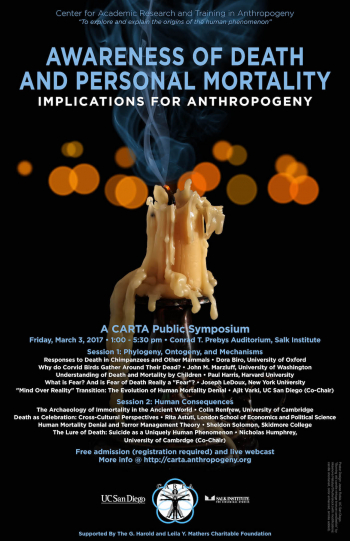Awareness of Death and Personal Mortality: Implications for Anthropogeny
Nicholas Humphrey, Senior Member, Darwin College, University of Cambridge
Ajit Varki, UC San Diego School of Medicine
While certain warm-blooded social animals and birds appear to react selectively and specifically to the death of other members of their group, humans seem to be very unusual in the quality and extent of our responses, and in the ability to translate these experiences into an understanding of our personal mortality. When during childhood do these levels of understanding emerge? What is the underlying neurobiological basis for fears of death and mortality? When during human evolution did these fears emerge, and how did our ancestors tolerate them without sinking into an evolutionary dead end of depression or hopelessness? Assuming we found a solution to this dilemma, why are we still the only mammals that commit suicide? What does the archaeological, historical and cross-cultural record tell us about these matters? And what are the consequences for our current human condition, ranging from self-esteem to social organization, to political leanings? This symposium will bring together expert speakers from a wide range of different disciplines that are relevant to seeking answers to these questions. In the process we will gain a better understanding of how increasing awareness of death and personal mortality shaped the origin of humans.
Examples of Organizations Relevant to Death Awareness and Mortality:
| Academic/Research Organizations | General/Public Outreach Organizations |
Media for each talk can be played by clicking on icons in the table below, or by clicking on the individual talk titles below and then the attachment file at the bottom of the page.
| Speakers | Media | Session |
|---|---|---|
 Fred Gage |
|
Welcome |
 Nicholas Humphrey |
|
Opening Remarks |
 Dora Biro |
|
Responses to Death in Chimpanzees and Other Mammals How non-human animals respond to dead or dying conspecifics, and what their responses may reveal about the extent to which a concept of “death” is present outside the hominin lineage, are questions currently generating intense scientific interest. Answers to these questions may help elucidate the evolutionary origins of a range of death-related psychological states and behaviours in our species, such as grief, mourning, understanding of mortality and mortuary practices. In addition, they raise... read more |
 John Marzluff |
|
Why do Corvid Birds Gather Around Their Dead? The discovery of a dead member of one’s own species is a profound, potentially emotional, and certainly informative experience. Social species, from insects to humans, seem especially intrigued by their dead. While mammals often attend to their dead for periods lasting from hours to days, most insect and bird responses are of much shorter duration. The responses of birds, which typically include large and conspicuous gatherings and displays, appear to be motivated by a need to displace or... read more |
 Paul Harris |
|
Understanding of Death and Mortality by Children Two different research programs have addressed children’s developing conception of death. On the one hand, children have been viewed as apprentice biologists who come to view death as an inevitable part of the life cycle. According to this view, which can be traced back to Piaget, children’s cognitive development moves toward an objective understanding. Piecemeal observations are increasingly coordinated into a coherent, theory-like organization. More recently, children have also been viewed as... read more |
 Joseph LeDoux |
|
What is Fear? And Is Fear of Death Really a “Fear”? Fear is generally considered a response to an immediately present threat. As a result, when scientists study fear they measure the way the brain detects and responds to threats. These responses are viewed as proxies for the conscious feelings of fear. But are they? In humans so-called “fear” responses can occur without awareness of the stimulus and without any feeling of “fear.” Further, in humans, different brain circuits underlie the conscious feeling of fear and the behavioral and... read more |
 Ajit Varki |
|
"Mind Over Reality Transition": The Evolution of Human Mortality Denial Some aspects of human cognition and behavior appear unusual or exaggerated relative to those of other intelligent, warm-blooded, long-lived social species––including certain mammals (cetaceans, elephants and great apes) and birds (corvids and passerines). One such collection of related features is our facile ability for reality denial in the face of clear facts, a high capacity for self-deception and false beliefs, overarching optimism bias and irrational risk-taking behavior––traits that... read more |
 Colin Renfrew |
|
The Archaeology of Immortality in the Ancient World Deliberate burials appear in the archaeological with archaic Homo sapiens, c.1000,000 BP, cemeteries prior to the advent of agriculture (before 10,000 BP). Belief in immortality is difficult to document before the emergence of state societies and the construction of deities, although the attention accorded to some special materials (jade, gold) may suggest earlier notions of immortality. |
 Rita Astuti |
|
Death as Celebration: Cross-Cultural Perspectives Humans, like all other living organisms, are born and die. This is an incontrovertible and non-negotiable fact. However, because of their unique representational capacities, humans across the world imbue this fact with complex meanings, which transform the brute facts of biology. A recurrent feature of this transformation is to make death the beginning rather than the end of life. Through various processes of separation, purification and ‘distillation’ dead people are turned into forever... read more |
 Sheldon Solomon |
|
Human Mortality Denial and Terror Management Theory In The Denial of Death, cultural anthropologist Ernest Becker argued that “the idea of death, the fear of it, haunts the human animal like nothing else; it is a mainspring of human activity—activity designed largely to avoid the fatality of death, to overcome it by denying in some way that it is the final destiny for man.” Humans manage the terror of death by adhering to culturally constructed beliefs about reality that provide a sense that one is a person of value in a world of meaning, and... read more |
 Nicholas Humphrey |
|
The Lure of Death: Suicide as a Uniquely Human Phenomenon Once humans began to understand that death brings to an end a person’s bodily and mental presence in the world, the possibility arose that in certain circumstances individuals would deliberately choose this outcome for themselves. Suicide has in fact become an alarmingly common trait, responsible for more deaths than war and homicide combined. In this talk I shall ask what this means for human biological fitness. While some suicides are arguably adaptive, the majority are clearly maladaptive... read more |
 Ajit Varki  All Speakers  Pascal Gagneux |
|
Wrap-up, Question and Answer Session, Closing Remarks |
| Attachment | Size |
|---|---|
| 1.42 MB | |
| 1.31 MB | |
| 102.14 KB | |
| 137.59 KB | |
| 25.56 MB |
If you enjoy this event, please consider supporting CARTA's quest to explore and explain the human phenomenon.


